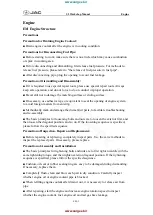
mean that the OCS is working improperly. Decreasing
the front passenger’s seated weight on the front pas-
senger seat may result in deactivation of the Passenger
Advanced Front Air Bag causing serious injury or death.
Increasing the front passenger’s seated weight on the
front passenger seat may result in activation of the Pas-
senger Advanced Front Air Bag. Examples of improper
front passenger seating include:
•
The front passenger’s weight is transferred to
another part of the vehicle (like the door, arm rest or
instrument panel).
•
The front passenger leans forward, sideways, or
turns to face the rear of the vehicle.
•
The front passenger’s seatback is not in the full
upright position.
•
The front passenger carries or holds an object while
seated (e.g., backpack, box, etc.).
•
Objects are lodged under the front passenger seat.
•
Objects are lodged between the front passenger
seat and center console.
•
Accessories that may change the seated weight on
the front passenger seat are attached to the front
passenger seat.
•
Anything that may decrease or increase the front
passenger’s seated weight.
The OCS determines the front passenger’s most prob-
able classification. If an occupant in the front passen-
ger seat is seated improperly, the occupant may provide
an output signal to the OCS that is different from the
occupant’s properly seated weight input, for example:
WARNING!
•
If a child restraint system, child, small teenager or
adult in the front passenger seat is seated improp-
erly, the occupant may provide an output signal to
the OCS that is different from the occupant’s prop-
erly seated weight input. This may result in serious
injury or death in a collision.
(Continued)
Not Seated Properly
Not Seated Properly
Not Seated Properly
Not Seated Properly
250
SAFETY
5538906_24_JL_OM_EN_USC_t_E1.pdf 250
5/22/2023 9:02:27 AM
















































